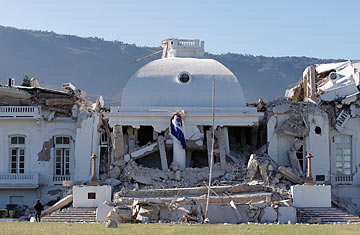
Haiti's damaged presidential palace
(2 of 2)
"We did capture wonderful information about the earthquake afterwards," says Blanpied. "But the earth gave no indication with a foreshock or an electrical signal or a water signal or anything else. It demonstrates to us what we've already learned: earthquake prediction, if it can be done at all, is very difficult."
That's not to say geologists aren't making headway. Instruments that detect P waves are a good example. Earthquakes set off two kinds of seismic vibrations: body waves, which move through the interior of the earth, and surface waves, which move on top. The fastest of the body waves is the P wave, and it's thus the first to travel from the epicenter to a seismic station where it can be detected. P waves don't give you a whole lot of notice, but even a little bit can help. In California, gas lines in many homes are now equipped with P-wave detectors, which sense a coming tremor and shut off the inflow valve to prevent fires and explosions if the house is shaken severely.
Much to the disappointment of pet lovers, the celebrated ability of animals to predict quakes before they happen is not all it's said to be. It's true that animals are more sensitive to shaking than humans are, so they may feel a tremor a few seconds before we do. But you need the right animal in the right spot at just the right moment, and even then, that detection doesn't buy you much extra time. Nonetheless, Blanpied says, the research goes on.
For now, the best the USGS and other organizations can do is use the global web of seismometers and other instruments that are already in place and always being improved to build the best map possible of the planet's interior and at least narrow the predictive window of when quakes are likely to happen. They can also use these data to anticipate how severe the next tremor, whenever it comes, is likely to be. This can help drive policy decisions like improving building codes, reinforcing infrastructure and zoning some areas as unsuitable for development. That's hardly the same as precise predicting, but if your home or your life is the one that's spared, it's plenty good enough.
